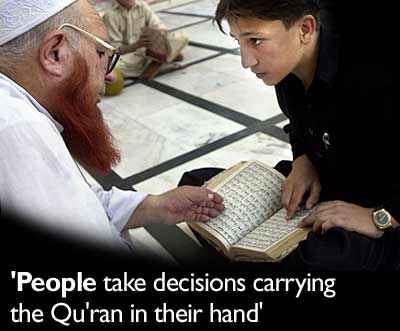Home > News > Specials
The Rediff Special/Sheela Bhatt
January 22, 2004

A group of experienced grassroots workers from the South Asia Partnership organisation in Lahore tell Contributing Editor Sheela Bhatt why they think Pakistan is changing.
Series: A new Pakistan?
Part I: We have never seen changes like these in the last 50 years
Part II: 'The elders have a softer attitude towards India'
Part IV: 'The teachers in Pakistan are pro-jihad'
More than 70 per cent of the Pakistanis earn their livelihood from farming. I believe Pakistan is changing, but we still have a lot to worry about. Though the electrical supply and the quality of our roads has improved, the poor and the middle class are becoming increasingly dependent on multinationals.People have telephones and electricity, but they don't have the money to pay their bills. The culture of community living is fading as is the spirit of cooperation. Rural culture is changing in the name of politics, religion and biradari (brotherhood).
The image of India is excellent amongst the elderly villagers. When I sit with them they tell me, 'Ji, khurak to bas desh ki hoti thi [There is no food like (Indian) food].'
They call India desh, their old country, and are particularly attached to the lanes and by-lanes of their ancestral Indian villages. As recently as the last decade, there were a huge number of people who thought they would return to India some day!
But I don't see any positive feelings for India in the younger generation, who have become victims of propaganda. While they like Hindi films and film actresses, they also harbour the notion that India is an enemy country. So, you see, there are two Indias for Pakistan.
Today's generation is struggling to survive. The farmers are more worried about the price their produce will command in the market. A young farmer in the rural areas does not think independently about India like his elders do. As far as he is concerned, what the maulvi says is the final word. They tell us the maulvi can't lie while sitting in masjid.
People take decisions carrying the Qu'ran in their hand. People vote here in the name of Islam. Behind every truck you'll find the legend, Pakistan fauj ko salaam (a salute to the army of Pakistan).
Some also believe that a man who kills a kafir, a non-believer, will be rewarded with a place in heaven. Some consider killing a kafir as jihad. I even know a man who joined the Lashkar-e-Tayiba because he was frustrated.
Also, the villagers here consider television and radio, which is their only source of information, as sacrosanct as the maulvi in the masjid. They are unaware of the media's political leanings or their limitations.
Now, however, a process of education has started which is fighting for reason. People are fed up of corruption. The common man here views democracy differently. If his complaints are heard at the local police station and he is able to sell his farm produces at a reasonable price, he is happy. Musharraf's uniform will not be a bone of contention if the local police pay heed to the common man's complaints.
The people have recently started talking about the fact that their own children are hungry and yet they are fighting for Kashmir. Of course, there are many jokes about Vajpayee. Many social leaders think that eventually, the demands of globalisation will bring down the tempers on Kashmir.
Mehmood Ahmed works for the rights of farmers.
Series: A new Pakistan?
Part I: We have never seen changes like these in the last 50 years
Part II: 'The elders have a softer attitude towards India'
Part IV: 'The teachers in Pakistan are pro-jihad'
Photograph: Chris Hondros/Getty Images
Image: Uttam Ghosh